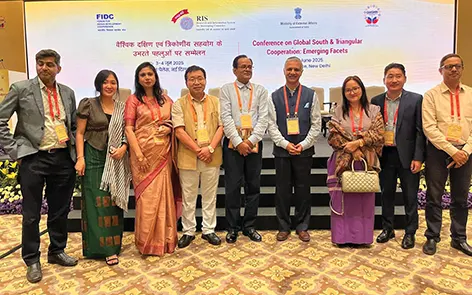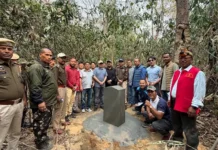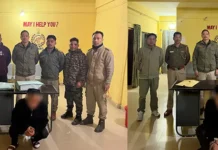NEW DELHI, 6 Jun: Doimukh-based Rajiv Gandhi University (RGU) signed a memorandum of understanding (MoU) with the Research and Information System (RIS) for Developing Countries under the Ministry of External Affairs in a groundbreaking initiative to promote academic cooperation and research excellence.
The MoU was signed on the sidelines of an international conference on ‘Global South & Triangular Cooperation: Emerging Facets’ conducted
on 3-4 June in New Delhi, which brought together delegates from Global South countries.
The MoU signing marks a significant milestone in the G20 University Connect initiative, where 101 universities were shortlisted, but only 21, including RGU, were selected to sign an MoU for collaboration with the RIS.
The selection was based on four key criteria: geographical area, remote regions from the national capital, success of the G20 University Connect programme, and strong engagement with the students.
The MoU document was signed by RGU Registrar Dr NT Rikam and RIS Director General Prof Sachin Chaturvedi, in the presence of a galaxy of vice-chancellors and academicians.
The RGU delegation was headed by Acting Vice-Chancellor Prof SK Nayak, Dr Rikam, and its Education Department Professor Kesang Degi.
Prof Nayak highlighted the university’s academic contributions and its commitment to inclusive development, particularly in the Northeastern region. Prof Degi also participated in a special session on NETRA (North East Training for Research and Advocacy) and addressed the potentials, issues and opportunities of Arunachal Pradesh.
The collaboration seeks to support specialized training programmes, most notably through the NETRA initiative, geared towards strengthening the research ecosystem and academic infrastructure in frontier regions.
The partnership is rooted in a shared vision to promote joint research and policy studies on development issues pertinent to the Global South. It aims to facilitate academic exchange, knowledge sharing, and meaningful policy dialogues among students, scholars, and faculty across participating institutions. A key focus lies in contributing to capacity building, regional development, and evidence-based policymaking, particularly in underserved and geographically remote areas such as India’s Northeast.



